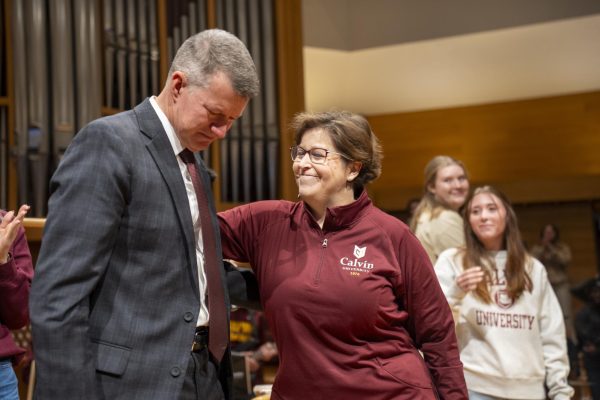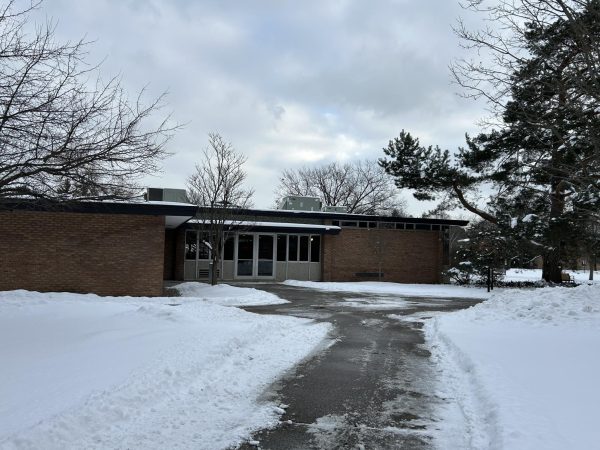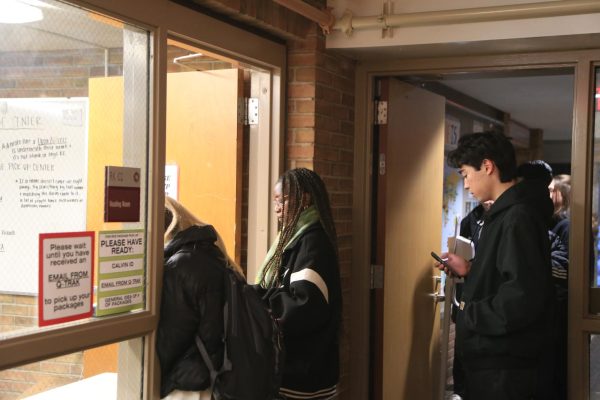SAPT flag display present statistics
This April, students, faculty and staff of the Sexual Assault Prevention Team (SAPT) have worked to raise awareness of both the destructive results and surprisingly high frequency of sexual assault cases, particularly on college campuses. Last week, SAPT set up a striking visual on Commons Lawn: hundreds of white flags.
“If you apply national statistics to our campus, each of the 570 flags represents a victim here at Calvin,” said Renee De Vries, the administrative assistant for Germanic and Asian languages. De Vries has been with SAPT for the past five years. A victim of sexual assault herself, her work with SAPT has particular significance and relevancy.
According to a SAPT staff member, the Help Desk senior analyst with Calvin Information Technology (CIT), the 570 flags corresponded with startling national statistics. One in every five college-aged women are victims of sexual assault. Out of about 2,000 female students at Calvin, that’s around 400 cases.
Occurring only slightly less frequently for women faculty, staff and employees, one in every six working-age females is a victim of sexual assault. Out of about 500 female workers and staff, that’s hovering around 83 cases.
But sexual assault victims are not only women. According to national ratios, there would be about 83 male student victims on campus, and about 17 male employees and staff that have been subjected to sexual assault.
“When you read a statistic you say ‘oh, that’s a lot’ and you keep moving. But when you see those flags it can be really jarring. 570 is a lot of flags,” said De Vries.
This is the third year SAPT has coordinated the flag display on Commons Lawn. Its relevancy continues to be painfully present on campus, as De Vries and others have experienced sexual assault, or are personally connected with those who have.
“I have a lot of friends and a lot of family, even higher than statistics would suggest,” said De Vries. “I have a passion for the issue because it is so underreported, especially on college campuses.”
The flags on Commons Lawn have a dual purpose: in part, they serve as a visual representation of support for survivors on campus, both those who have reported and those who have not felt safe to report; but they also create awareness for those who have not experienced sexual assault, encouraging others to see the issue as relevant and to remove the oppressive, counter-productive stigma surrounding the issue.
Empowering people to report sexual assault is a critical issue, according to De Vries, particularly on Christian college campuses where there is a tendency to keep quiet about issues like sexual assault.
“[Sexual assault] is one of the most underreported crimes,” said De Vries. “If your car is stolen you go right to the police. But in the case of sexual assault, a lot of people are afraid to come forward.”
With a campus-wide display, it can be difficult to judge an event’s effectiveness and success. But according to student Sarah Bass, who joined SAPT in 2015, the flag display “facilitat[ed] multiple occasions for people to decorate flags. [The display] allowed space for people to share their stories, prayers and support.”
Even though sexual assault continues to be an underreported issue, Calvin offers multiple safe spaces for victims and friends of victims to report. There’s an open-door and amnesty policy at Calvin, which allows students to report sexual assault without fear of being convicted or something situationally related. For example, if the sexual assault occurred at a party with under aged drinking, a sexual assault victim would not be convicted for under-aged drinking if they needed to report the sexual assault.
“We have an amazing judicial affairs department at Calvin. And we have Broene Counseling Center, which has many resources and a process to help you report,” said De Vries. “There are a lot of resources available.”
As of now, SAPT is looking for a new student member for their team. Contact information and materials for applying can be found on their website, as well as resources for reporting and preventing further sexual assault cases on campus.






